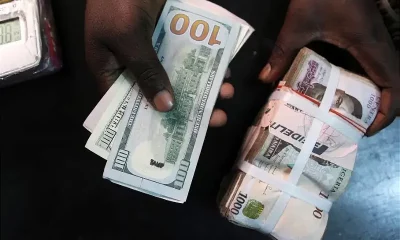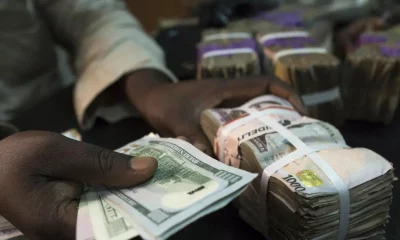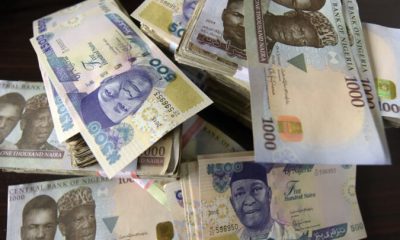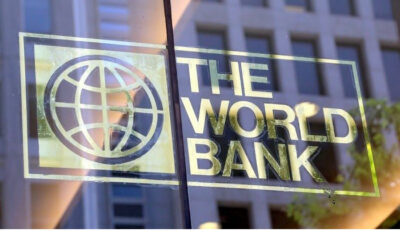Headline
Naira hits 1,025/$, job losses, factory shutdown loom
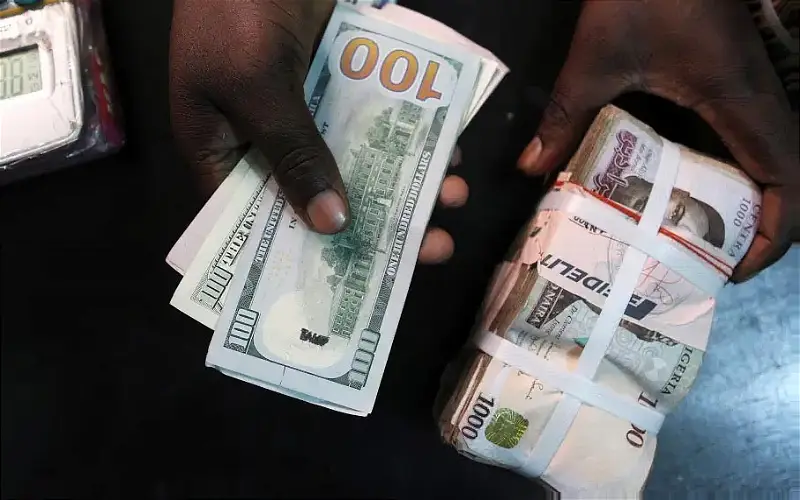
The naira fell further on Tuesday as it exchanged for the dollar at the parallel market between 1,005/$ and 1,025/$.
Owners of small-scale enterprises, Nigeria Employers’ Consultative Association, and manufacturers, expressed concern about the falling value of the naira, warning that it would lead to the shutting down of factories and attendant job losses.
The naira has maintained a downward trend since the Central Bank of Nigeria allowed a free float of the national currency against the dollar and other global currencies in June.
This decline has further led to manufacturers struggling to get raw materials, with more companies planning to sack more workers or shut down.
With the declining naira value, manufacturers are faced with cutting production, jobs, and raw material imports.
Naira hits 1,025/$
Bureau de Change operators said the naira exchanged for the dollar at the parallel market between 1,005/$ and 1,025/$ on Tuesday.
A BDC operator in Lagos, Yusuf Kareem, who spoke to one of our correspondents, stated, “We bought for N1,005/$ and sold for 1,025/$ on Tuesday. The money is still scarce. The value of the naira has been falling.”
Another BDC operator in Lagos, Musa Yunus, said, “The naira was traded at 980/$ two weeks ago, but today, it is 1,020/$. We don’t know what will happen tomorrow because it has not been coming down.”
Another BDC operator in Lagos, who simply identified himself as Idris, said, “I am not sure you can buy up to $1,000 from me now because it is not available. We buy at the rate of 1,000/$, but I sell at 1,015/$.”
Babangida, another BDC in Lagos, said, “I sell for N1,010 per $ and buy at the rate of N1,000.”
He said, “This will lead to increasing imported inflation as prices of imported items will increase while also increasing export income in naira for those who export goods and services.
“If we export more than imports, the net effect will be positive. High import prices can also help to moderate demand for some imported items in the medium term.”
Also speaking, the Director-General of Nigeria Employers’ Consultative Association, Mr Adewale Oyerinde, said the primary focus should be how the government would address the challenges related to foreign exchange.
Oyerinde said, “Presently, the forex situation poses a significant obstacle to procuring essential inputs and is causing disruptions in our financial projections. The escalating forex issue is hindering progress, and until it is resolved, our endeavours cannot take flight.”
However, a facilitator with the Nigeria Economic Summit Group, Dr Ikenna Nwaosu, said many companies would shut down because of this.
He said, “It will lead to some companies shutting down. First of all, if the cost of production and the cost of their raw materials exceed a certain stage and they can’t sell their final products because the market doesn’t accept a certain price, then they will end up losing. So many people are going to stop production and that means there would be unemployment, maybe temporary unemployment. They could close down for some time, so there would be a snowball effect. It will lead to companies closing since the Federal Government has closed all special windows for foreign exchange. Finally, it will impact the educational sector because, for students who are going overseas, there is no special window for them. They used to buy at a special window but now they are buying at the open market.”
Nwaosu lamented that the constant rise in the dollar rate would lead to a rise in the price of petroleum because of the purchasing power.
He said, “The next thing we will hear first is that the price of petrol will rise because of the cost of purchasing it. Secondly, the exchange rate for calculating import rates by the Nigeria Customs Service will rise. It will rise again, and once that happens, there will be a rise in import duty, and at the end of the day, the price increase is passed to the final consumer. It is also going to add to inflation, and with the rise in the price of fuel and rise in import duty, the rise of food will go up. And it means that the negotiation for the minimum wage would be stiffer. Nigeria Labour Congress is saying N200,000 as minimum wage. If the dollar is like this, what will happen? So these are the key impacts of this high dollar rate. I recommend that there should be a direct intervention from the CBN. The president’s instruction that the CBN should hand it off and let market intervention take over is not working for us. And, mind you, the war in the Middle East will worsen our high dollar rate.”
A chieftain of the Association of Nigerian Licensed Customs Agents, Mr Pius Ujubuonu, said, “The systems have been paralysed already, especially the freight forwarding sector, including the seaports, land borders and airport. Before now, what we used to pay, say N2m, has jumped to N7m, and it is not healthy; it is killing businesses. If this continues like this, I am not sure there would be any import in the coming months and many cargoes would be abandoned.”
Reps plan probe
The House of Representatives on Tuesday directed the Committee on Banking Regulation to probe the use of the dollar and other foreign currencies as legal tender for domestic transactions in Nigeria.
It also called on the CBN to address the impact of the failing Naira against the Dollar and other currencies by implementing monetary policy adjustments to stabilise the currency, address speculative activities in the forex market, and increase the withdrawal limit of the naira to reduce the pressure on dollars and other foreign currencies.
It further urged the Federal Government to formulate policies and structural reforms to reduce corruption and promote economic diversification within the nation’s economy.
The resolution to investigate the use of the dollar and other foreign currencies in Nigeria as legal tender for domestic transactions was a sequel to a motion moved by Ismail Dabo (APC, Bauchi) on Tuesday during plenary.
Moving the motion, the legislator said the naira continues to fall against major currencies since the unification declaration by President Bola Tinubu because of the scarcity of forex.
Dabo said the country’s inability to earn sufficient forex means that the naira could further slide down, causing crippling inflation. He noted that oil theft had further depleted the ability of the country to earn foreign exchange.
“The president’s intention is to allow market forces to determine naira value, but the alarming exchange rate has impacted Nigeria’s economy, causing untold hardship due to increased demand for dollars and a dollar shortage.
“About 90 per cent of Nigeria’s total export earnings are from oil, which is the mainstay of the country’s economy, but changes in the price of oil around the world have a big impact on the country’s foreign exchange market. This explains why the naira has continued to depreciate,” he said.
Mr Dabo added, “A weaker and depreciating naira could increase Nigeria’s external debt servicing costs, potentially reducing government spending on critical sectors like healthcare and education.”
Contributing to the motion, Ademorin Kuye (APC, Lagos), said there was a need for the CBN to tackle the depreciation of the naira while clamping down on the domestic use of dollars.
He stated that most international airlines demand dollars for payment of airfare, while real-estate companies also demand dollars for means of payment.
“Today, if you want to fly foreign airlines, they charge you dollars. In some high-end markets, particularly real estate, they charge you dollars. This is criminal,” Mr Kuye said.
Also speaking in support of the motion, Bamidele Salam (PDP, Osun), noted that the new management team of the CBN had not provided a policy direction since their confirmation by the Senate.
“The management has been confirmed since but we have not heard a policy statement from him, and the market reacts to policy statements,” he said.
The House further urged the Federal Government to promote exportation and reduce importation by enhancing foreign investors’ confidence in its Fiscal and Monetary Policies.
It mandated the Committees on Banking Regulations and National Security and Intelligence to interface with the Central Bank of Nigeria with the purpose of initiating compliance strategies.
Headline
Fagbemi warns against obstructing EFCC from performing its lawful duty

The Minister of Justice, Lateef Fagbemi, SAN has warned against obstructing the Economic and Financial Crimes Commission (EFCC) from carrying out its lawful duty .
Fagbemi’s warning is contained in a statement in Abuja.
“This is a matter of very grave concern, it is now beyond doubt that the EFCC is given power by the law to invite any person of interest to interact with them in the course of their investigations into any matter, regardless of status.
“Therefore, the least that we can all do when invited, is not to put any obstruction in the way of EFCC, but to honourably answer their invitation.
“A situation where public officials who are themselves subject of protection by law enforcement agents will set up a stratagem of obstruction to the civil and commendable efforts of the EFCC to perform its duty is to say the least, insufferably disquieting’’.
He added that running away from the law will not resolve issues at stake but only exacerbate them.
“Nigeria has a vibrant judicial system that is capable of protecting everyone who follows the rule of law in seeking protection.
“I therefore encourage anyone who has been invited by the EFCC or any other agency to immediately toe the path of decency and civility by honouring such invitation instead of embarking on a temporising self-help and escapism.
“This can only put our country in bad light before the rest of the world’’.
He said institutions of state should be allowed to function effectively and efficiently.
“I stand for the rule of law and will promptly call EFCC, and indeed any other agency to order when there is an indication of any transgressions of the fundamental rights of any Nigerian by any of the agencies’’.
NAN reports that the EFCC had on Wednesday warned members of the public that it was a criminal offence to obstruct officers of the Commission from carrying out their lawful duties.
Section 38(2)(a(b) of the EFCC Establishment Act makes it an offence to prevent officers of the Commission from carrying out their lawful duties. Culprits risk a jail term of not less than five years.
The warning , the EFCC said, became necessary against the background of the increasing tendency by persons and groups under investigation by the Commission to take the laws into their hands by recruiting thugs to obstruct lawful operations of the EFCC.
On several occasions, the anti graft agency said, operatives of the Commission have had to exercise utmost restraint in the face of such provocation to avoid a breakdown of law and order.
Headline
Unknown Gunmen Abduct Channelstv Reporter In Port-harcourt

Some unknown gunmen have kidnapped Joshua Rogers, the ChannelsTV reporter in Port-Harcourt, the Rivers State capital.
Politics Nigeria learnt that Rogers was picked up close to his residence at Rumuosi in Port Harcourt and to an unknown destination by the gunmen around 9pm on Thursday, April 11.
The reporter was driving his official ChannelsTV branded car when the hoodlums accosted, pointed a gun at him and took him away in the same vehicle.
Rogers was said to be returning from his official assignment in Government House after a trip to Andoni for a government event when the incident happened.
Already, the gunmen were said to have contacted his wife and demanded a N30million ransom for bis release.
His cameraman confirmed the incident and appealed to his abductors to set him free unconditionally.
-
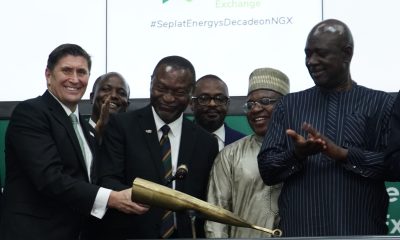
 Business4 days ago
Business4 days agoSeplat Energy celebrates a decade of Dual Listing with Bell Ringing Ceremony at Nigerian Stock Exchange
-
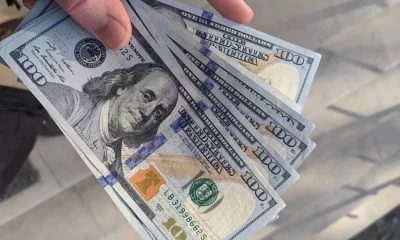
 News4 days ago
News4 days agoBDCs now buying dollar at ₦980 — ABCON President
-

 Metro4 days ago
Metro4 days agoOsun Poly Student, Olanrewaju Olatona killed by hit-and-run one-way driver
-
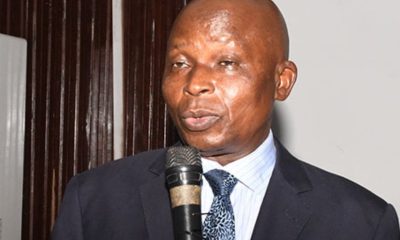
 Headline4 days ago
Headline4 days agoFagbemi warns against obstructing EFCC from performing its lawful duty
-
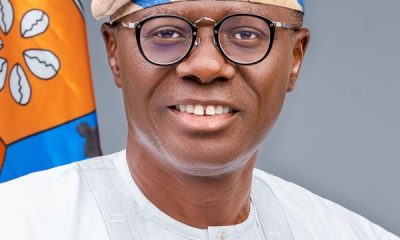
 News4 days ago
News4 days agoLASG’s maize palliative impactful, says poultry association chair
-

 News4 days ago
News4 days agoWoman killed while crossing road in Anambra

